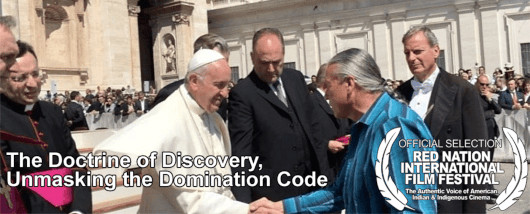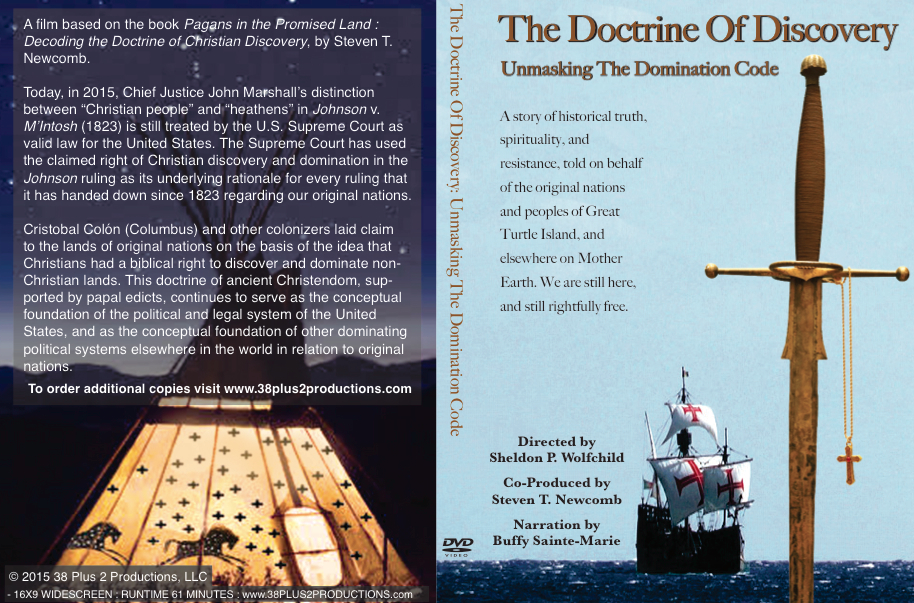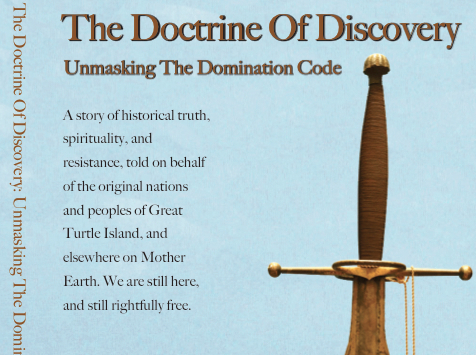by 38 plus 2 productions and Steven T. Newcomb
Watch the trailer, rent or buy on Vimeo
 This powerful and landmark documentary “The Doctrine of Discovery: Unmasking The Domination Code” is a result of the collaborative efforts by Dakota filmmaker and Director Sheldon Wolfchild and Co-Producer Steven Newcomb (Shawnee, Lenape). The film, based on Newcomb’s thirty years of research, and his book Pagans in the Promised Land: Decoding the Doctrine of Christian Discovery (Fulcrum, 2008 and in Libraries), brings to the big screen an amazing and little known story: The first Christian people to locate lands inhabited by non-Christians (“infidels, heathens, and savages”) claimed the right to assert a right of domination to be in themselves.
This powerful and landmark documentary “The Doctrine of Discovery: Unmasking The Domination Code” is a result of the collaborative efforts by Dakota filmmaker and Director Sheldon Wolfchild and Co-Producer Steven Newcomb (Shawnee, Lenape). The film, based on Newcomb’s thirty years of research, and his book Pagans in the Promised Land: Decoding the Doctrine of Christian Discovery (Fulcrum, 2008 and in Libraries), brings to the big screen an amazing and little known story: The first Christian people to locate lands inhabited by non-Christians (“infidels, heathens, and savages”) claimed the right to assert a right of domination to be in themselves.
On the basis of this religiously premised argument, the U.S. Supreme Court has defined the land title of the Indian nations as a “mere right of occupancy” subject to a right of domination on the part of the United States.
The first “Christian people” that claimed “ultimate dominion,” said the Supreme Court, could grant away the soil while yet it was still in the possession of the “natives, who were heathens.” See 500 Years of Injustice: The Legacy of Fifteenth Century Religious Prejudice for a summary of historical sources Steven Newcomb had identified by 1992.
Birgil Kills Straight, a Headman of the Oglala Lakota Nation, provides insight into the traditional wisdom and teachings of the Seven Laws of the Oglala Lakota.
Woope Sakowin (Seven Laws)
- Wacante Oganake, “To help, to share, to give, to be generous.”
- Wowaunsila, “Pity, Compassion.”
- Wowauonihan, “To Repect, to Honor.”
- Wowacintanka, “Patience and Tolerance.”
- Wowahwala, “To be Humble, To Seek Humility.”
- Woohitike, “To be Guided By Your Principles, Disciplined, Bravery and Courage.”
- Woksape, “Understanding and Wisdom.”
The documentary points out that the traditional teachings of original nations and peoples form an alternative to the dehumanizing domination system of Christendom. Theologian Luis Rivera-Pagán, who is interviewed in the film, points out in his book A Violent Evangelism: The Religious and Political Conquest of the Americas (1992 and in Libraries), that an accurate history must account for the theological and religious justifications for claims of domination over the original nations and peoples. Rivera-Pagán talks about the devastating effects of “the absolute devaluation of one’s being,” or, in other words, dehumanization.
The book Indians of the Americas, published in 1947 by John Collier (1884-1968), was referenced in the film. Collier was the Commissioner of Indian Affairs from 1933 to 1945. Chapter 1 is The American Indian and the Long Hope. It opens like this:
They had what the world has lost. They have it now. What the world has lost, the world must have again, lest it die. Not many years are left to have or have not, to recapture the lost ingredient…
What in our human world is this power to live? It is the ancient, lost reverence and passion for human personality, joined with the ancient, lost reverence and passion for the earth and its web of life.
This indivisible reverence and passion is what the American Indians almost universally had; and representative groups of them have it still.
They had and have this power for living, which our modern world has lost—as world-view and self-view, as tradition and institution. . .
By virtue of this power, the densely populated Inca state, by universal agreement among its people, made the conservation and increase of the earth’s resources its foundational national policy. Never before, never since has a nation done what the Inca state did. . .
If our modern world should be able to recapture this power, the earth’s natural resources and web of life would not be irrevocably wasted within the twentieth century, which is the prospect now. True democracy, founded in neighborhoods and reaching over the world, would become the realized heaven on earth. And living peace—not just an interlude between wars—would be born and would last through the ages.
The film calls upon the Holy See at the Vatican to revoke the papal decrees that set into motion the domination system, and points out that the values and teachings of original nations are a sacred path for all Life.
DVD cover for The Doctrine of Discovery, Unmasking The Domination Code
To order the film send a check or money order for $21.50 USD to: 38 Plus 2 Productions 40163 Reservation Hwy 3, Morton MN, 56270 If interested in bulk rate or having producers conduct a public showing please contact Steven Newcomb. Watch trailer, rent/buy on Vimeo.
Decolonize U.S. Federal Indian Law
by Steven Newcomb
Indian Country Today
8 Mar 2016, updated: 12 Sep 2018
The documentary movie “The Doctrine of Discovery: Unmasking the Domination Code,” directed by Sheldon Wolfchild (Dakota), tells a powerful story. Sheldon and I created the movie based on my book Pagans in the Promised Land: Decoding the Doctrine of Discovery (2008), and on the basis of other research that I first began reading Vine Deloria, Jr.’s books during my teenage years in the early 1970’s.
After audiences see the movie, they tend to ask, “What can we do?” Whenever I’m asked this or some similar question, I always think about how difficult it will be to fundamentally reform the attitudes, values, and beliefs of the dominating U.S. society relative to our Native nations. Such work is easier said than done. It’s not as if respect for our original nations can be legislated into existence, for example.
Every audience that sees “The Doctrine of Discovery” is introduced to a pattern-recognition that I’ve been working to understand and to develop since I began my research. As a result, the movie enables people to see the mental and behavioral patterns of Christian domination that are traced to the Vatican papal documents of the fifteenth century, and that are still being used against our original nations. Learning to recognize such patterns is important because, as the saying goes, knowledge is power. People who want the United States to stop using the Christian-premised doctrine of domination against our nations and peoples need to know why it is important for people everywhere on Mother Earth to challenge the assumed “right” to dominate others.
“The Doctrine of Discovery: Unmasking the Domination Code,” shows why it is that when U.S. government officials claimed our ancestors were in need of “human and Christian civilization,” they were actually calling for the domination of our nations and peoples. Viewers of the movie are informed that “civilization” in that context involves “the forcing of a particular cultural pattern on a population to which it is foreign.” The word “forcing” indicates that the word “civilization” is tied to an underlying and forcible pattern of domination. As a counter measure, I made certain that “The Doctrine of Discovery” speaks about our nations as “the originally and still rightfully free nations” of Great Turtle Island (the North American continent and the Western hemisphere). In other words, despite claims by the United States and other countries to the contrary, our nations continue to be rightfully free from the imposed Christian doctrine of domination.
There are many reasons why our audiences are shocked by what they see in “The Doctrine of Discovery.” The movie teaches them to “see” the dehumanizing assumptions that were and still are readily accepted, such as the view that the pope or other Christian monarchs had a “God-given right” to grant to Christian monarchs a “right” of domination over our original nations and our territories. The movie shows how such attitudes often resulted in the indiscriminate slaughter of our ancestors, men, women, children, and even infants, and resulted in Christian societies enriching themselves by overrunning and robbing our national territories.
The assumed right based on Genesis 1:28 in the Bible to subdue and to dominate, while attempting to altogether eliminate our nations and peoples through genocidal acts, was based on certain metaphorical comparisons made by the Christian world. Christians saw our nations as “heathen” (a word defined as “of Christian origin”) and “infidel” (“those not of the Christian faith”), and “barbarous” nations, and therefore as “less than human.” They even compared our ancestors to “beasts” (bestias, in Spanish). The Christian world thought of the territories of our nations as devoid of, and therefore in need of, Christian dominion (i.e., domination).
Such religious patterns of thought and behavior resulted from the premise that the Christian and American empires, as they proceeded with their imperial expansions across this continent and throughout this hemisphere (North, Central and South America), had the perfect right to exert a Christian-premised domination over our nations and peoples. Native people today who consider themselves Christian might want to question me metaphorically characterizing our nations as “heathen.” Take the Cherokee Nation, as an example, they might say. Once it had fully embraced Christianity it could no longer be considered “heathen,” right? Wrong.
“The Doctrine of Discovery” documentary shows that in order for the doctrine of Christian discovery and domination to not apply to your nation, it had to have been Christian nation before the Christians first invasively arrived. Lands not already inhabited by Christians when Christians first arrived as a colonizing force were deemed subject to the claim by the Christian world of a biblical right to subdue the earth and dominate all living things. According to the doctrine of Christian domination, you cannot become Christian after the Christians invasively arrived as a means of your nation escaping the claimed right of Christian domination. Your religious conversion to Christianity will not be credited to your nation retroactively because as a non-Christian you were categorized by the Christian World as, “nullus,” “null and void.” “The Doctrine of Discovery: Unmasking the Domination Code” makes these patterns recognizable.
Upon reflection, what could be clearer than the fact that every one of our Native nations can trace its existence to a time before Christians had ever invaded this continent? What is more clear than the fact that the white men who sat on the early U.S. Supreme Court mentally created and imposed certain metaphorical ideas on our nations, ideas which the United States government now assumes that our rightfully free nations are obligated to accept and obey? “The Doctrine of Discovery: Unmasking the Domination Code” argues that we need to reject such claims of domination that are still being made against our nations on the basis of a claim of Christian “superiority” or “ascendancy.”
When Chief Justice John Marshall said that the United States had adopted the principle of “Christian people” by applying the “right of discovery” to lands that were inhabited “heathens,” he as the Chief Justice, a unanimous Supreme Court as a body, and the United States government as a whole, thereby applied a biblical context and form of reasoning to and against our nations and peoples. This biblical pattern of reasoning about non-Christian “heathen” nations only having a “right of occupancy” and a “diminished” independence, became an established precedent of the U.S. Supreme Court as a result of the Johnson v. M’Intosh ruling, which the United States government first began imposing on our nations one hundred and ninety three years ago.
“The Doctrine of Discovery: Unmasking the Domination Code” is a movie which demonstrates that we need to reject the United States’ imposition of biblical thinking on our nations. Now that the late Justice Scalia must be replaced on the U.S. Supreme Court, it will be necessary for President Obama (or his successor if the Republican-controlled U.S. Senate has its way) to appoint a new member to the bench. Once the new appointee has been confirmed, he or she will be expected to make decisions about our Native nations, using the U.S. tradition of such ideas as “subjection,” “mere occupancy,” “conquest,” “conquering,” “plenary power,” and more, on the basis of the doctrine of Christian discovery and domination.
Steven Newcomb (Shawnee, Lenape) is co-founder and co-director of the Indigenous Law Institute, and author of Pagans in the Promised Land: Decoding the Doctrine of Christian Discovery (Fulcrum, 2008 and in Libraries). He is a producer of the documentary movie, The Doctrine of Discovery: Unmasking the Domination Code, directed and produced by Sheldon Wolfchild (Dakota), with narration by Buffy Sainte-Marie (Cree). The movie can be ordered from 38Plus2Productions.com.

